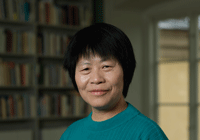
Sinkwan Cheng
EURIAS Fellow, SCAS
Over the past decade and a half, Sinkwan Cheng has been awarded ten (inter-)national fellowships
in various European and North American countries, including an ias Fellowship at Durham Uni-
versity, a Rockefeller Fellowship and a daad Fellowship. She has given faculty seminars and
lectures in the United Kingdom, the United States (including Columbia University), the Netherlands,
Germany, China, South Korea, Macau and Hong Kong. Cheng has received an Excellence in
Teaching Award in a campus-wide competition at SUNY Buffalo.
Cheng is the editor of Law, Justice, and Power: Between
Reason and Will (Stanford University
Press, 2004). Her
writings can also be found in MLN, Cardozo Law Review, Law and Literature,
Literature and Psychology and The American Journal of Semiotics, and refereed venues in the
United Kingdom, France, Germany, Canada and Spain. Among her articles are ‘Comparative
Philosophies of Tragedy: Buddhism, Lacan and Ashes of Time’ (MLN, 2008); ‘Civilization and
the Two Faces of Law: J.M.
Coetzee’s Waiting for the Barbarians’ (Cardozo Law Review, 2003);
‘Ressentiment, the Superego, and Totalitarianism: George Orwell’s 1984’ (Cardozo Law Review,
2003); ‘Translation, the
Introduction of Western Time Consciousness into the Chinese Language,
and Chinese Modernity’ (in A Hartmann & O
Murawska (eds), Representing the Future: Zur
kulturellen Logik der Zukunft, Transcript Verlag, 2015); ‘Translatio Temporis and Translatio Imperii:
From ‘Wenming versus Civilization’ to ‘Wenming as Civilization’ (in C. Armand, V. Boullet & D. Ten
Eyck (eds), Enjeux et Positionnements de l’Interdisciplinarité/Positioning Interdisciplinarity, Presses
Universitaires de Nancy, 2014); ‘Terrorism, Hegel, Honneth’ (Las Torres de Lucca: Revista Internacional
de Filosofía Política, 2013); and ‘Fremdwörter as ‘the Jews of Language’ and Adorno’s Politics of Exile’
(in M. O’Neill, Adorno, Culture and Feminism, 1999) .
During her time at SCAS, Cheng will tackle comparative politics by extending Koselleck’s Begriffs-
geschichte method using translation studies. Her findings include how Chinese translations/inter-
pretations of Western concepts have shaped Chinese politics in a particular direction to date.
The
central concepts she is exploring include ‘rights’ and ‘citizen’.
This information is accurate as of the academic year 2015-16.






